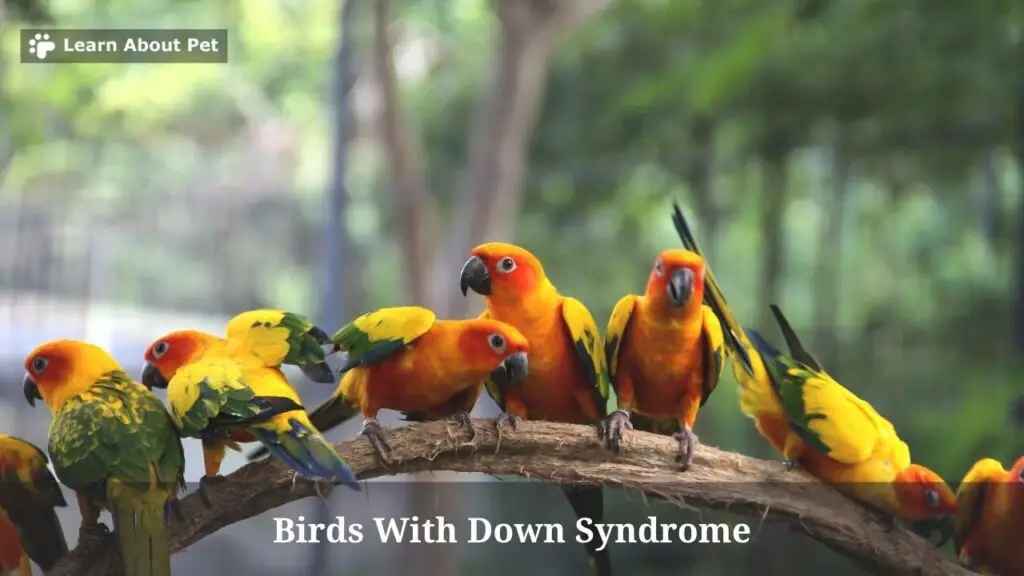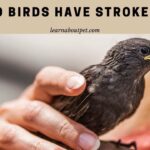In recent years, there have been lots of stories about birds having Down syndrome. But can birds actually have Down syndrome? And if yes, how would Down syndrome manifest in birds? This article has answers.
It is really not possible to have birds with Down syndrome. This is because the genetic makeup of birds doesn’t have room for the chromosomal defect that brings about Down syndrome. But some birds can have signs of mental retardation due to other causes.
There are also cases in which birds may be diagnosed with a condition we refer to as ‘clubbed down syndrome’. Sometimes, people mistake this growth disorder for actual Down syndrome.
But there is a vast difference between the ‘Down syndrome’ we see in humans and ‘clubbed down syndrome’ in birds.

Any talk about a bird with Down syndrome is not correct ab initio. This is because the chromosomal defect that causes Down syndrome in humans can’t quite occur in birds.
Yet going online, you may find videos of, among others, a big bird with Down syndrome. But closer study reveals that the bird only happens to have odd appearance and perhaps some cognitive retardation.
So that is the basis for the Down syndrome bird disorder allegation.
Then again if someone happens to keep birds like chickens, and they have very greatly slowed growth, a vet may diagnose them with ‘clubbed down syndrome’.
The clubbed down syndrome in this case would be quite a different type of disorder.
But let’s first dig deeper into the question of whether birds can get Down syndrome.
Can Birds Have Down Syndrome?
The simple answer is ‘no’. Birds can’t have Down syndrome.
In humans, Down syndrome occurs due a chromosomal defect. This is specifically a defect that affects the 21st chromosome.
That sort of chromosomal disorder never occurs in birds. Therefore birds can’t have Down syndrome.
Nonetheless, birds may have some features similar to what we see in individuals with Down syndrome.
They may have a somewhat droopy facial appearance, perhaps with some degree of mental retardation as well. So you find that the birds have some Down syndrome features.
But since the actual genetic defect that causes Down syndrome in humans can’t be there in birds, we can’t say that the birds are suffering from ‘Down syndrome’.
Nonetheless, it would be understandable for someone whose bird has such features to start asking, can a bird have Down syndrome?
The whole thing is akin to asking, can birds be autistic? And if you research on that question (of do birds have autism), you find that some may have symptoms similar to those we see in autistic individuals.
But one can’t really purport to diagnose them with ‘autism’, because their genetic makeup is quite different…
In a similar manner, one can’t purport to diagnose birds with having ‘Down syndrome’.
It then follows that questions like on what causes Down syndrome in birds, when do birds get Down syndrome and how to care for birds with Down syndrome are moot.
Why Do People Associate Down Syndrome With Birds?
There are several possible reasons as to why people associate Down syndrome with birds. That in spite of the birds not actually being capable of having Down syndrome.
First is if people happen to see birds with features similar to those we see in individuals with Down syndrome.
The birds in question may have a droopy facial appearance. They may also have some level of unmistakable mental retardation. And they may even be clumsy, to a level of appearing as if they have permanent ataxia.
Indeed, the latter feature often gets people wondering, what does ataxia look like in birds?
So when people see that their birds have features similar to those seen in Down syndrome, they suspect that the birds have the syndrome.
Secondly, there are cases in which vets diagnose birds whose growth is slowed with ‘clubbed down syndrome’. This sometimes occurs in broilers.
But the people who get that diagnosis may mistake it for something close to the Down syndrome we see in humans.
Thirdly, there are those who may associate birds with having Down syndrome on account of trying to anthropomorphize them. So they try pushing human qualities and issues on the birds.
It is similar to how you would even find someone asking, can birds get Stockholm syndrome: on that very account.

Can Crows Have Down Syndrome?
Crows are birds. And as we have seen, it is really not possible for birds to have Down syndrome. Thus by inference, crows cannot have Down syndrome.
What may happen at times is that some crows may show signs of mental retardation.
If such crows also happen to have other features like droopy facial appearance and clumsiness, one can easily suspect of them of having Down syndrome.
But the truth of the matter is that crows can’t have Down syndrome.
Can Parakeets Have Down Syndrome?
It is not possible for parakeets to have Down syndrome.
Down syndrome occurs in humans, due to a defect that affects the 21st chromosome. That defect can’t occur in birds like parakeets. For that reason, parakeets can’t have Down syndrome.
Parakeets may have some sort of mental retardation. But this would be due to some other cause, not Down syndrome.
If your parakeet happens to have severe mental retardation, you can have a vet examine it and try to diagnose the reason for it. Don’t, however, expect it to be due to Down syndrome.
Down syndrome can’t occur in birds like parakeets.
Incidentally, since parakeets are close to parrots, we also often have people asking, can parrots have Down syndrome? And the answer is along the lines outlined above: that it is not possible for parrots or any other birds to have Down syndrome.
Can Chickens Have Down Syndrome?
Chicken can’t have Down syndrome.
What chicken may have is another condition we refer to as ‘clubbed down syndrome’. This is very distinct from the ‘Down syndrome’ we see in humans.
In clubbed down syndrome, the birds fail to grow completely. You sometimes find broilers weighing only 45 grams, on account of this syndrome!
Thus if a vet happens to diagnose your chicken with clubbed down syndrome, don’t mistake it for the Down syndrome we see in humans.
On another note, some chickens can have apparently severe mental retardation, leading owners to suspect them of having Down syndrome.
But consultation with vets usually reveals that the mental retardation is due to some other cause. It is not due to Down syndrome. Birds – including chicken – can’t have Down syndrome.
Can Ducks Have Down Syndrome?
It is really not possible for ducks to have Down syndrome.
Even if a duck has mental retardation, a droopy appearance and all other features of Down syndrome, it still can’t be actually diagnosed with Down syndrome.
Remember, ducks are birds. And like all other birds, they have a different genetic makeup to humans.
In humans, what we refer to as Down syndrome is a condition that occurs due to a defect in a certain chromosome. That defect can’t occur in birds, like ducks.
For that reason, it is really not possible for ducks to have Down syndrome.
Final Verdict – Birds With Down Syndrome
The condition we refer to as ‘Down syndrome’ in humans occurs due to a certain chromosomal defect. This is specifically a defect that affects the 21st chromosome.
Now that particular defect can’t occur in birds, since birds have a different genetic makeup.
It follows then that birds can’t really have Down syndrome.
Nonetheless, it is possible for birds to have mental retardation and other features that make their owners to, understandably, suspect them of having Down syndrome.

There is also a condition we refer to as ‘clubbed Down syndrome’ in chicken and other birds. This slows their growth severely. Some people mistake it for being exactly the same as the Down syndrome we see in humans.
However, the clubbing Down syndrome we see in chicken and other birds is distinct.
Birds can’t have actual Down syndrome: the one that is responsible for mental retardation in humans.
As a pet lover, make sure to learn about pet more and give your pet birds a good and comfortable life!

Welcome to Learn About Pet. My name is Rajkumar Ravichandran and I love all pets, travel, and amazing food. I write about my passion and personal experience caring for multiple pets in this blog! ❤️
Post Disclaimer
DISCLAIMER: THIS BLOG OR WEBSITE, "Learn About Pet", DOES NOT PROVIDE YOU WITH MEDICAL ADVICE AND IS NOT A SUBSTITUTE FOR MEDICAL ADVICE. ALWAYS GET IN TOUCH WITH YOUR PERSONAL VETERINARIAN AND USE INFORMATION HERE AS GENERAL ADVICE.
The information, including but not limited to, text, graphics, images and other material contained on this website are for informational purposes only. No material on this site is intended to be a substitute for professional veterinary advice, food recommendation, diagnosis, or treatment. Always seek the advice of your veterinarian or other qualified health care provider with any questions you may have regarding a medical condition or for pet food related questions.







